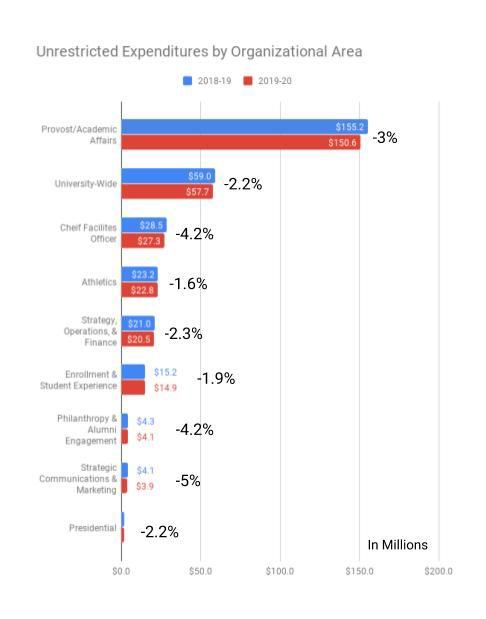Regents approve WKU budget with $8.6 million in cuts
June 21, 2019
WKU’s Board of Regents approved a $387.8 million operating budget for the coming year on Friday, one that will require the university’s academic colleges to trim spending by $3.4 million and support units to cut $5.2 million.
The budget for fiscal year 2020 is only $675,000 less than the 2019 budget and includes a 2% tuition increase for students. But significant cuts are required because of increases in WKU’s fixed costs — items like health insurance and faculty promotions, but especially because of a sharp spike required in pension payments to the Kentucky Employees Retirement System.
The cuts for the 2019-20 budget year come on top of more than $27 million in budget cuts imposed in 2018-19.
The budget the regents approved Friday did not spell out specific cuts. Rather, each college and support unit will be assigned a “targeted reduction” amount to be cut during the budget year.
Across the university, those reduction targets for the 2020 fiscal year total more than $8.6 million and range from a high of about 5% for strategic communications and marketing to a low of 1.6% for athletics. The largest area of WKU’s budget, for academic affairs, is taking an overall cut of nearly $4.6 million, or about 3%, leaving it with a budget of $150.6 million.
Ann Mead, WKU’s retiring senior vice president for finance and administration, said the 23rd budget she had prepared for WKU depends mostly on tuition and fees from students, which account for about 48 percent of all revenues. State appropriations of $73.7 million make up just 19 percent of the budget.
“We’re dependent on the students, we’re dependent on the state,” Mead said.
The budget, she said, also will rely on $13.2 million in “carry forward” funds, money budgeted in previous years but not spent, to balance. Mead projected there could be as much as $24 million available in carry-forward funds, based on spending through May of the current year, which ends June 30.
In the budget, about 57% of WKU’s unrestricted funds of $302.9 million for 2019-20, or $173.4 million, is dedicated to personnel, which includes salaries and wages. “At 57%, you know in the past it makes it very hard to make some reduction decisions because it impacts the employment base,” Mead said.
Student aid makes up 17%, or $51.2 milion, of the unrestricted budget. Mead said that this portion of the budget is a priority so WKU can continue to meet the needs of students.
The regents approved a tuition increase in March for the coming year, to $5,401 a semester. However, WKU is projecting a continued enrollment decline of about 690 students from the 19,461 enrolled in Fall 2018, resulting in a decline of $10.5 million in tuition revenue, according to documents released with the agenda for Friday’s meeting.
The budget approved Friday also includes a $2.5 million strategic investment fund that was created in line with WKU’s strategic plan. This will be “seed money” to fund projects for a year or two until permanent funding becomes available, Mead said. These funds can be used to grow or enhance academic programs, improve recruitment, and other things.
The board also approved a capital budget that includes $38.5 million, generated through WKU’s food service contract with Aramark, for the project to transform Margie Helm Library into the WKU Commons.
President Timothy Caboni said that the approved budget was a step to achieving the new financial plan for WKU.
“The way to think about this is before you run, you have to walk,” Caboni said. “Before you walk, you have to crawl, so we are somewhere between walk-crawl and walk this year.”
News reporter Lily Burris can be reached at 270-745-6011 and [email protected]. Follow her on Twitter at @lily_burris.
























